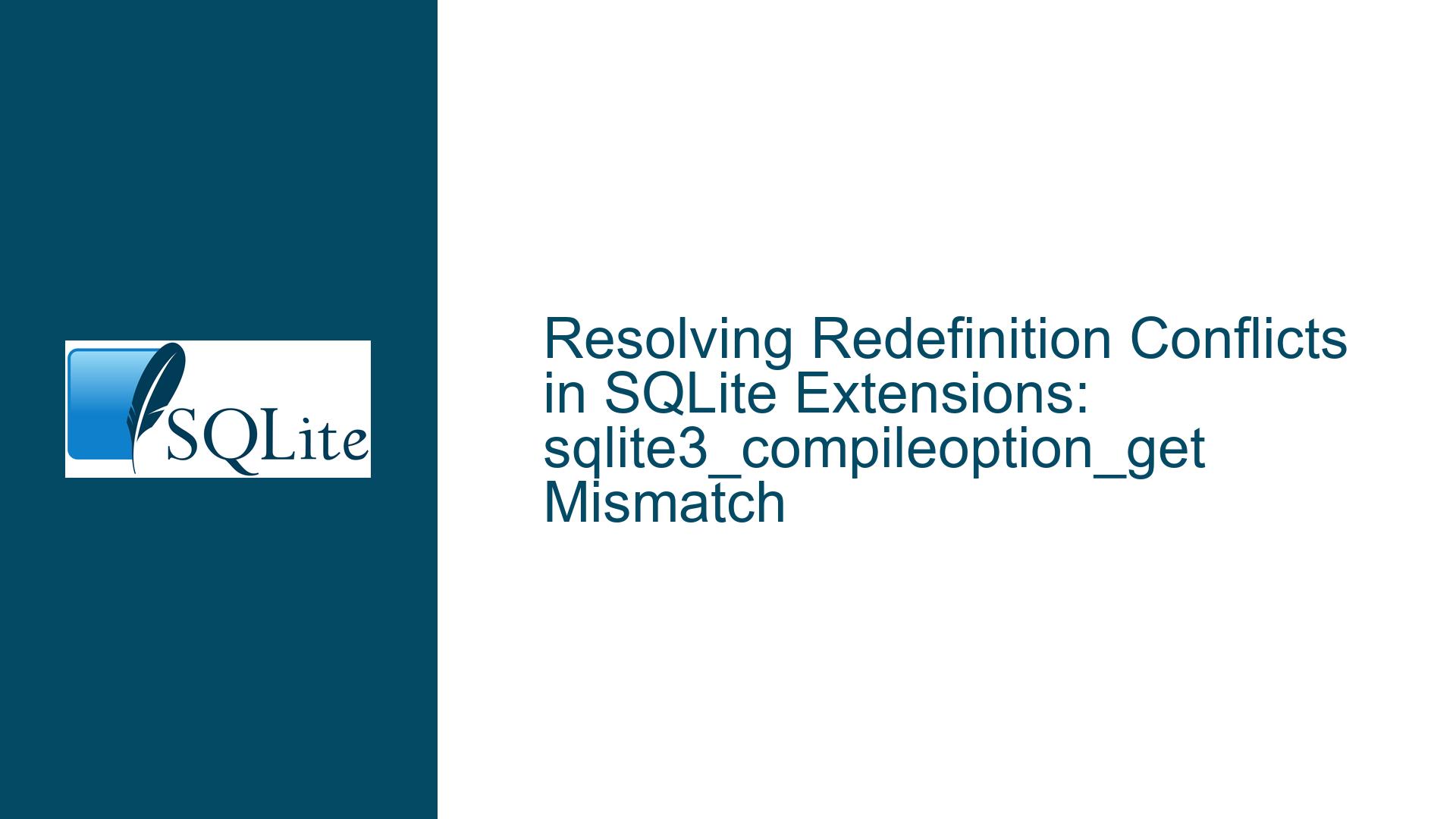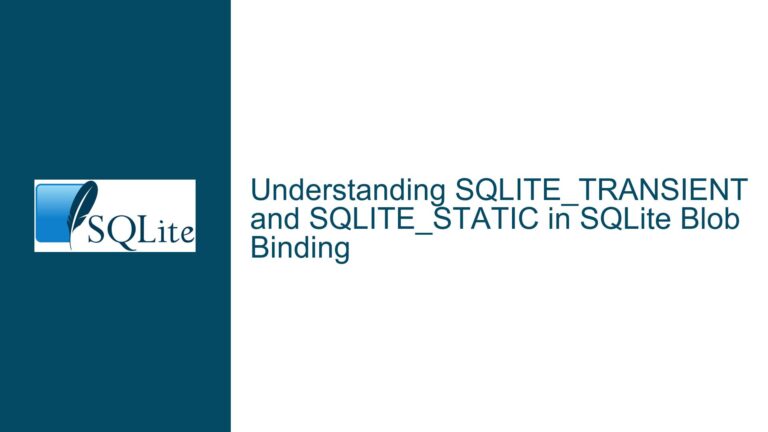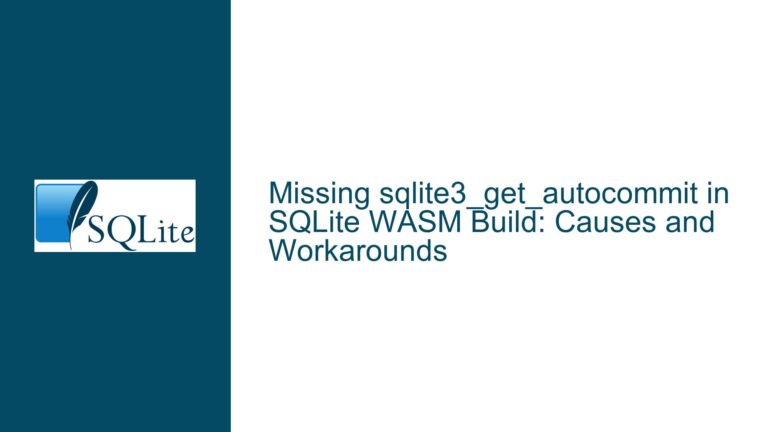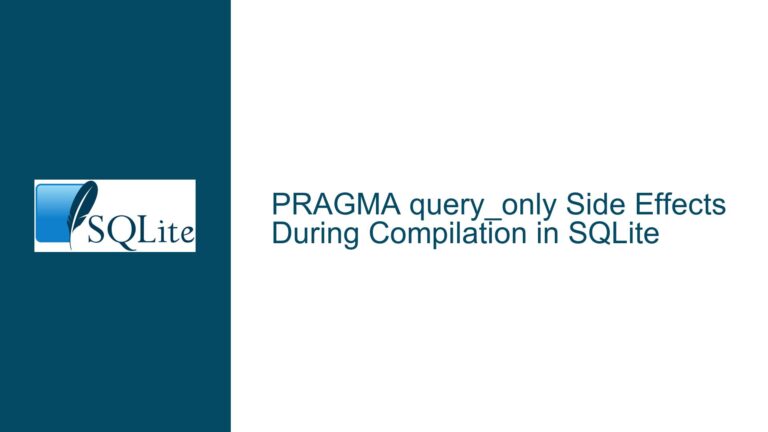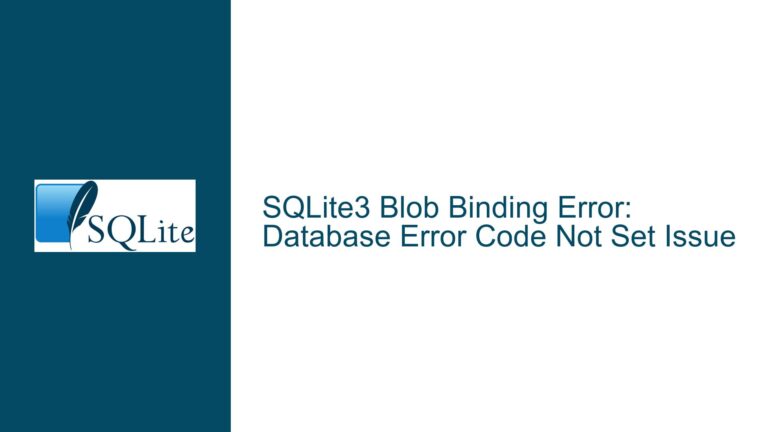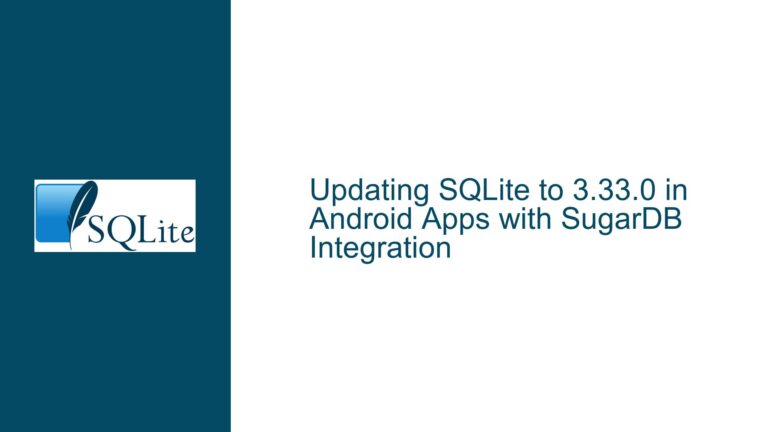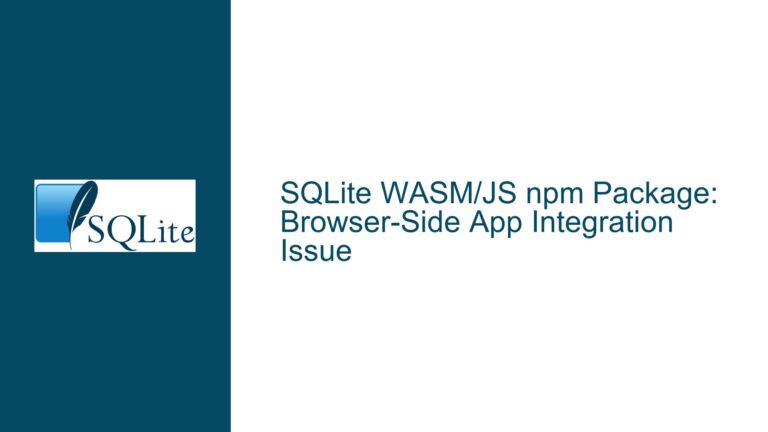Resolving Redefinition Conflicts in SQLite Extensions: sqlite3_compileoption_get Mismatch
Issue Overview: Conflicting Macro Definitions Between SQLite Headers and Extensions
When integrating SQLite extensions or custom recovery APIs (such as ext/recover components) into a project, developers may encounter a macro redefinition error involving sqlite3_compileoption_get. This error arises due to conflicting definitions of the macro across SQLite’s primary header (sqlite3.h) and extension-specific headers (sqlite3ext.h). The core conflict is between two distinct implementations of the macro:
Standard SQLite Header (
sqlite3.h):
When theSQLITE_OMIT_COMPILEOPTION_DIAGSmacro is defined during compilation (to omit compile-time diagnostic options),sqlite3.hdefinessqlite3_compileoption_getas((void*)0). This effectively nullifies the function, stripping compile-option diagnostics from the build.Extension Header (
sqlite3ext.h):
The extension header redefinessqlite3_compileoption_getto point to the SQLite API’s internal function pointer:sqlite3_api->compileoption_get. This is critical for extensions to dynamically bind to SQLite’s runtime API.
When both headers are included in a project—common when building extensions that interact with SQLite’s core—the preprocessor encounters two conflicting definitions of the same macro. This results in a compilation error: "sqlite3_compileoption_get redefined".
The conflict is exacerbated by the conditional compilation logic in sqlite3ext.h, where sqlite3_compileoption_get is defined outside the SQLITE_OMIT_COMPILEOPTION_DIAGS guard block. This oversight forces developers to reconcile the two definitions manually.
Possible Causes: Architectural and Configuration Conflicts
Understanding the root causes of this conflict requires dissecting SQLite’s header structure, extension loading mechanisms, and compilation settings.
Cause 1: Header Inclusion Order and Macro Guarding
SQLite extensions typically require including sqlite3ext.h after sqlite3.h to ensure proper API initialization. However, if SQLITE_OMIT_COMPILEOPTION_DIAGS is defined globally (e.g., via compiler flags or project-wide configurations), sqlite3.h will define sqlite3_compileoption_get as a null pointer. When sqlite3ext.h is subsequently included, it attempts to redefine the macro to use the API’s function pointer, leading to a conflict.
Cause 2: Inconsistent Use of SQLITE_OMIT_COMPILEOPTION_DIAGS
The SQLITE_OMIT_COMPILEOPTION_DIAGS macro is designed to remove compile-time diagnostic functions to reduce binary size or comply with security policies. If this macro is defined for the core SQLite library but not for the extension code, the extension’s headers will assume the diagnostic functions are available, causing mismatched expectations.
Cause 3: Extension API Binding Mechanism
SQLite extensions rely on a dynamic API binding process where sqlite3ext.h redirects core API functions (e.g., sqlite3_create_function_v2, sqlite3_compileoption_get) to a global sqlite3_api structure. This redirection is mandatory for extensions to function correctly, as they cannot statically link to SQLite’s core. If the macros responsible for this redirection are suppressed or altered (e.g., via SQLITE_OMIT_COMPILEOPTION_DIAGS), the extension will fail to bind to the API.
Cause 4: Compiler Flag Propagation
In complex build systems, compiler flags intended for the core SQLite library (like -DSQLITE_OMIT_COMPILEOPTION_DIAGS) may inadvertently propagate to extension modules. This results in inconsistent macro definitions across compilation units, with the core library omitting diagnostics and the extension expecting them.
Troubleshooting Steps, Solutions & Fixes: Resolving Macro Conflicts
Step 1: Audit Compilation Flags and Macro Definitions
Begin by verifying whether SQLITE_OMIT_COMPILEOPTION_DIAGS is defined in your build environment. This macro is often set via compiler command-line flags (e.g., -DSQLITE_OMIT_COMPILEOPTION_DIAGS) or in a header file included before SQLite headers.
Action:
- Inspect build scripts (e.g., Makefiles, CMakeLists.txt) for
-Dflags related to SQLite. - Use preprocessor output to check active macros:
gcc -E -dD sqlite3.c | grep SQLITE_OMIT_COMPILEOPTION_DIAGS - If the macro is defined, determine whether it’s necessary for your project. Removing it may resolve the conflict.
Step 2: Adjust Header Inclusion Order
Ensure sqlite3.h is included before sqlite3ext.h in all source files that use the extension API. This allows sqlite3ext.h to reference the core API correctly.
Action:
- In your extension’s source files, enforce the inclusion order:
#include "sqlite3.h" #include "sqlite3ext.h" SQLITE_EXTENSION_INIT1 - Verify that no third-party headers or precompiled headers invert this order.
Step 3: Isolate Conflicting Macros in sqlite3ext.h
If retaining SQLITE_OMIT_COMPILEOPTION_DIAGS is necessary, modify sqlite3ext.h to guard the conflicting macros under the same condition.
Action:
Locate the block in sqlite3ext.h where sqlite3_compileoption_get is defined. Adjust it to respect SQLITE_OMIT_COMPILEOPTION_DIAGS:
#ifndef SQLITE_OMIT_COMPILEOPTION_DIAGS
# define sqlite3_compileoption_used sqlite3_api->compileoption_used
# define sqlite3_compileoption_get sqlite3_api->compileoption_get
# define sqlite3_create_function_v2 sqlite3_api->create_function_v2
#endif
This ensures the macro is only defined if diagnostics are enabled, aligning with sqlite3.h’s behavior.
Risks of This Approach:
- API Binding Failures: If the extension relies on
sqlite3_compileoption_getfor API binding, omitting it may cause runtime errors. - Version Compatibility: Manual edits to
sqlite3ext.hmay break when upgrading SQLite. Consider maintaining a patch file.
Step 4: Use the Amalgamation Build
The SQLite amalgamation build (sqlite3.c + sqlite3.h) minimizes header conflicts by combining all core code into a single file. Extensions that include sqlite3ext.h can coexist with the amalgamation if configured correctly.
Action:
- Replace discrete SQLite source files with the amalgamation.
- Ensure
sqlite3ext.his included only in extension code, not the core amalgamation.
Step 5: Refactor Extension Initialization
If the conflict persists, refactor your extension to use explicit API binding without relying on macros.
Action:
- Replace macro usage with direct assignments to the
sqlite3_apistructure:sqlite3_api->compileoption_get(X); - Disable the conflicting macros entirely by defining
SQLITE_OMIT_COMPILEOPTION_DIAGSand avoiding their use in extensions.
Step 6: Conditional Compilation Wrappers
For projects requiring both diagnostics and extensions, use conditional compilation to isolate conflicting components.
Action:
- Wrap extension code in
#ifndef SQLITE_OMIT_COMPILEOPTION_DIAGSblocks. - Compile extensions and core SQLite as separate modules with differing macro definitions.
Step 7: Validate with Minimal Test Cases
Create a minimal test case that includes only SQLite headers and the extension to isolate the conflict.
Example:
#define SQLITE_OMIT_COMPILEOPTION_DIAGS
#include "sqlite3.h"
#include "sqlite3ext.h"
int main() {
return 0;
}
If this fails to compile, the conflict is confirmed. Apply fixes incrementally.
Step 8: Consult SQLite’s Extension Documentation
SQLite’s official documentation for loadable extensions provides guidance on API binding and macro usage. Cross-reference your approach with the recommended practices.
Key Resources:
Step 9: Community and Codebase Review
Review SQLite’s mailing list archives and GitHub issues for similar conflicts. For example, the recover extension is maintained separately and may have known incompatibilities with certain compile options.
Action:
- Search SQLite forum archives for “sqlite3_compileoption_get conflict”.
- Review the
ext/recovercodebase for usage of compile-option diagnostics.
Step 10: Long-Term Maintenance Strategies
To avoid recurring conflicts:
- Centralize Macro Definitions: Define all SQLITE_OMIT_* macros in a single configuration header.
- Isolate Extensions: Compile extensions as standalone shared libraries with independent compiler flags.
- Automate Header Patching: Use tools like
sedor CMake’sconfigure_fileto apply necessary patches tosqlite3ext.hduring build.
By systematically addressing header inclusion, macro definitions, and API binding mechanics, developers can resolve the sqlite3_compileoption_get redefinition error while maintaining the integrity of both SQLite core and its extensions.
